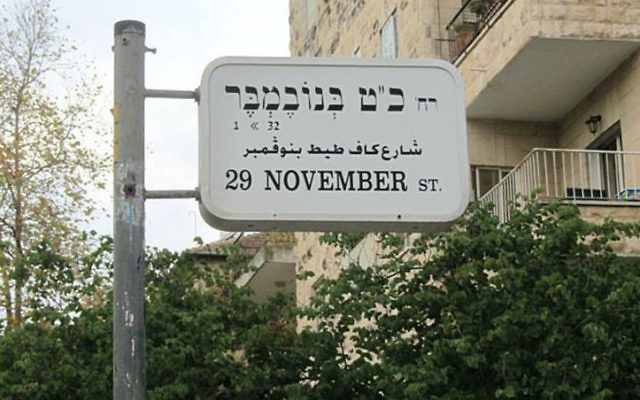UN Partition Resolution – a day we should celebrate
UN Resolution 181 which, on November 29, 1947, called for Palestine's partition into Arab and Jewish states, provided the legal basis for Israel's establishment six months later.
AS if 2017 hasn’t had enough Israel-related anniversaries already, here we are this week celebrating the 70th anniversary of the state’s founding, and yet another milestone in which Australia played a critical role.
Some would even argue it was the critical role.
No, the word “founding” isn’t a mistake or misprint.
True, we won’t celebrate the 70th anniversary of Israel’s Declaration of Independence until April, 2018.
But UN Resolution 181 which, on November 29, 1947, called for Palestine’s partition into Arab and Jewish states, provided the legal basis for Israel’s establishment six months later.
Even more than the State of Israel’s legal framework, however, the resolution was a watershed moment in Jewish and world history.
It was the international recognition, after two millennia, that the Jewish people had a right to its restored national sovereignty in its ancient homeland.
As someone growing up in Melbourne, who vividly remembers the news of partition as it came through from New York on Sunday morning, November 30 , and the sheer jubilation and wonderment of its impact on the Jewish community at the time, I’ve never quite understood the puzzle of non-celebration.
Put simply: Why hasn’t November 29, “Chaf Tet B’November” as it is known in Hebrew, been a far more celebrated anniversary in Israel and in the Jewish world? For the most part, and in most years since 1947, it has passed with hardly a mention.
Of course, understandably and rightly, celebrating Yom Ha’atzmaut – Israel Independence Day – in many ways superseded it.
Also, the UN’s unrelenting hostility towards Israel for 70 years hasn’t helped to make Israel and its supporters all that enthusiastic about hailing even one of its more decent and enlightened initiatives.
Sadly, for example, it’s no surprise that just as the Arab world refers to Israel’s establishment in 1948 as al-Nakbah ( The Catastrophe), the UN has for many years marked November 29 as the “International Day of Solidarity with the Palestinian People.”
But, all that said, if Yom Ha’atzmaut is a “major festival”, surely “Chaf Tet B’November” deserves to be a minor festival.
At least this year, it’s not completely forgotten. Just as most readers buy or receive this week’s AJN, Israel’s UN ambassador Danny Danon is due to convene a re-enactment of the historic vote in New York’s Queens Museum.
Before it was a museum, the site in New York’s heavily Jewish borough of Queens was the UN General Assembly’s temporary home. Today it’s near the United States Tennis Centre, home of the US Open.
A roll-call of international diplomats and world leaders were scheduled to join Ambassador Danon for the 70th anniversary. It will be interesting to catch up with the guest list of those who attended.
Anyone with the slightest level of historical imagination would have to wonder: What if? What if the Arabs had accepted the partition plan?
As for Australia’s role, it revolved principally around Herbert Vere Evatt’s chairmanship – and dominance – of the crucial United Nations Special Committee on Palestine (UNSCOP) which adopted the partition resolution on November 27, 1947, and recommended an immediate vote to the General Assembly.
Then Australia’s external affairs minister, Evatt later became United Nations president and presided over Israel’s admission to the world body.
A great Australia–Israel story, which a new generation of young Australian Jews should learn about in our schools.
It may be that I’m making too much of November 29. And nowadays, historians and commentators may differ as to how vital a role the UN partition resolution played.
Looking back on Israel’s military victories in the War of Independence and the UN’s abiding hostility to Israel in the decades that followed, some argue that Israel would have emerged regardless.
Their view is that Britain was preparing to leave Palestine anyhow, the Yishuv would have defied the UN and declared a Jewish state, and that the fledgling IDF would have defeated the Arab armies.
But at the time, the Zionist leaders such as David Ben-Gurion, Moshe Shertok (Sharet), and Chaim Weizmann – greeted the UN vote as a historic victory; many of Palestine’s 600,000 Jews danced in the streets; and many Jews in the Diaspora gathered in synagogues for prayers of thanksgiving.
In my view, the Jewish world was right to rejoice then, as it should now. As Abba Eban said in his memoir Personal Witness: “History after all is the story of opportunities; once they are lost they are unlikely to recur.”
In 1947, a small group of dedicated Zionists agreed.
With the help of 33 nations, Australia included, that voted in favour of UN Resolution 181, they seized the opportunity.
SAM LIPSKI is chief executive of the Pratt Foundation and a former editor of The AJN.


comments